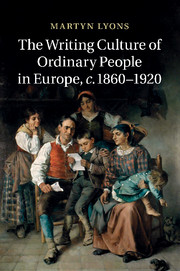Book contents
- Frontmatter
- Contents
- Illustrations
- Maps
- Acknowledgements
- Note on translations and transcriptions
- 1 Ordinary writings, extraordinary authors
- 2 Archives for an alternative history
- 3 ‘Excuse my bad writing’
- 4 Literary temptations
- 5 France
- 6 France
- 7 Family, village and motherland in the writing of Italian soldiers, 1915–1918
- 8 Italian identities ‘from below’ and ordinary writings from the Trentino
- 9 Love, death and writing on the Italian front, 1915–1918
- 10 Spain
- 11 Family strategy and individual identities in the letters of Spanish emigrants
- 12 Order and disorder in the ‘memory books’
- 13 Conclusions
- Bibliography
- Index
- References
7 - Family, village and motherland in the writing of Italian soldiers, 1915–1918
Published online by Cambridge University Press: 05 November 2012
- Frontmatter
- Contents
- Illustrations
- Maps
- Acknowledgements
- Note on translations and transcriptions
- 1 Ordinary writings, extraordinary authors
- 2 Archives for an alternative history
- 3 ‘Excuse my bad writing’
- 4 Literary temptations
- 5 France
- 6 France
- 7 Family, village and motherland in the writing of Italian soldiers, 1915–1918
- 8 Italian identities ‘from below’ and ordinary writings from the Trentino
- 9 Love, death and writing on the Italian front, 1915–1918
- 10 Spain
- 11 Family strategy and individual identities in the letters of Spanish emigrants
- 12 Order and disorder in the ‘memory books’
- 13 Conclusions
- Bibliography
- Index
- References
Summary
Italy’s war
In France, the nation-forming effort of the Third Republic had paid some dividends. The front held, even if some cracks and imperfections in the edifice made the construction of national unity incomplete. In comparison with France, however, Italy was less literate, more linguistically diverse and lacking in social cohesion. Italy’s peasant army had a weak sense of national identity. One can scour entire collections of soldiers’ correspondence without finding any mention of keywords like ‘victory’, ‘the motherland’ or even ‘Italy’ itself. That is not to say that there were no patriots fighting on the Isonzo: of course there were many, and a few of them will be recognised here. For the majority, however, their loyalty lay elsewhere and closer to home.
The next three chapters all discuss aspects of ordinary writings in Italy. This chapter presents the context of Italy’s war and some reasons for the neglect up until now of ordinary soldiers’ writing in Italy. I then turn to the importance of famiglia and paese in soldiers’ writing. Chapter eight will go on to examine aspects of ‘national identity from below’ from the perspective of ordinary soldiers. In chapter nine, ordinary wartime writings will be seen through a more personal and intimate lens, as a selection of love-letters is reviewed.
- Type
- Chapter
- Information
- The Writing Culture of Ordinary People in Europe, c.1860–1920 , pp. 113 - 133Publisher: Cambridge University PressPrint publication year: 2012



